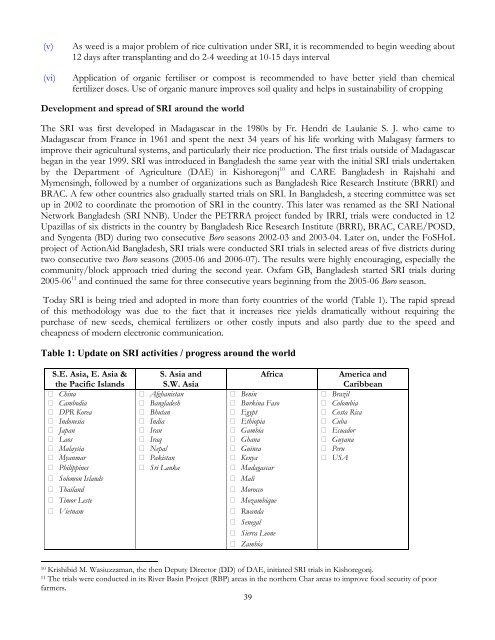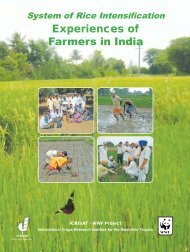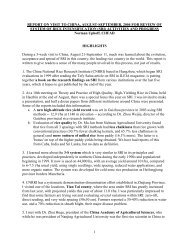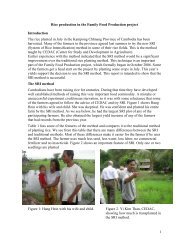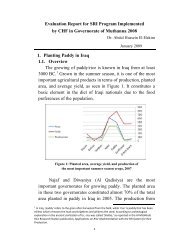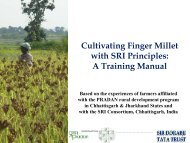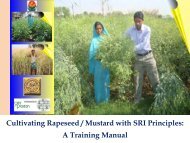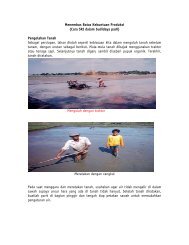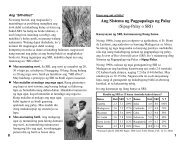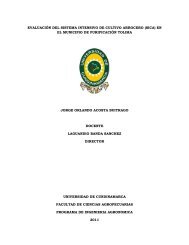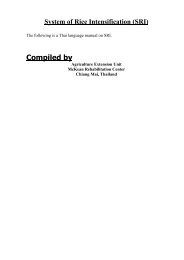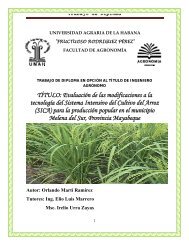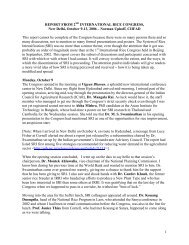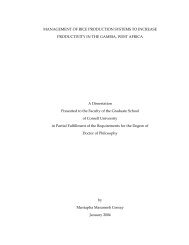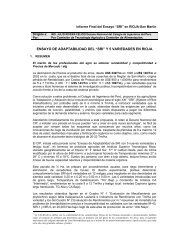Revised proceedings - The System of Rice Intensification - Cornell ...
Revised proceedings - The System of Rice Intensification - Cornell ...
Revised proceedings - The System of Rice Intensification - Cornell ...
You also want an ePaper? Increase the reach of your titles
YUMPU automatically turns print PDFs into web optimized ePapers that Google loves.
(v) As weed is a major problem <strong>of</strong> rice cultivation under SRI, it is recommended to begin weeding about<br />
12 days after transplanting and do 2-4 weeding at 10-15 days interval<br />
(vi) Application <strong>of</strong> organic fertiliser or compost is recommended to have better yield than chemical<br />
fertilizer doses. Use <strong>of</strong> organic manure improves soil quality and helps in sustainability <strong>of</strong> cropping<br />
Development and spread <strong>of</strong> SRI around the world<br />
<strong>The</strong> SRI was first developed in Madagascar in the 1980s by Fr. Hendri de Laulanie S. J. who came to<br />
Madagascar from France in 1961 and spent the next 34 years <strong>of</strong> his life working with Malagasy farmers to<br />
improve their agricultural systems, and particularly their rice production. <strong>The</strong> first trials outside <strong>of</strong> Madagascar<br />
began in the year 1999. SRI was introduced in Bangladesh the same year with the initial SRI trials undertaken<br />
by the Department <strong>of</strong> Agriculture (DAE) in Kishoregonj 10 and CARE Bangladesh in Rajshahi and<br />
Mymensingh, followed by a number <strong>of</strong> organizations such as Bangladesh <strong>Rice</strong> Research Institute (BRRI) and<br />
BRAC. A few other countries also gradually started trials on SRI. In Bangladesh, a steering committee was set<br />
up in 2002 to coordinate the promotion <strong>of</strong> SRI in the country. This later was renamed as the SRI National<br />
Network Bangladesh (SRI NNB). Under the PETRRA project funded by IRRI, trials were conducted in 12<br />
Upazillas <strong>of</strong> six districts in the country by Bangladesh <strong>Rice</strong> Research Institute (BRRI), BRAC, CARE/POSD,<br />
and Syngenta (BD) during two consecutive Boro seasons 2002-03 and 2003-04. Later on, under the FoSHoL<br />
project <strong>of</strong> ActionAid Bangladesh, SRI trials were conducted SRI trials in selected areas <strong>of</strong> five districts during<br />
two consecutive two Boro seasons (2005-06 and 2006-07). <strong>The</strong> results were highly encouraging, especially the<br />
community/block approach tried during the second year. Oxfam GB, Bangladesh started SRI trials during<br />
2005-06 11 and continued the same for three consecutive years beginning from the 2005-06 Boro season.<br />
Today SRI is being tried and adopted in more than forty countries <strong>of</strong> the world (Table 1). <strong>The</strong> rapid spread<br />
<strong>of</strong> this methodology was due to the fact that it increases rice yields dramatically without requiring the<br />
purchase <strong>of</strong> new seeds, chemical fertilizers or other costly inputs and also partly due to the speed and<br />
cheapness <strong>of</strong> modern electronic communication.<br />
Table 1: Update on SRI activities / progress around the world<br />
S.E. Asia, E. Asia & S. Asia and<br />
Africa America and<br />
the Pacific Islands S.W. Asia<br />
Caribbean<br />
China Afghanistan Benin Brazil<br />
Cambodia Bangladesh Burkina Faso Colombia<br />
DPR Korea Bhutan Egypt Costa Rica<br />
Indonesia India Ethiopia Cuba<br />
Japan Iran Gambia Ecuador<br />
Laos Iraq Ghana Guyana<br />
Malaysia Nepal Guinea Peru<br />
Myanmar Pakistan Kenya USA<br />
Philippines Sri Lanka Madagascar<br />
Solomon Islands Mali<br />
Thailand Morocco<br />
Timor Leste Mozambique<br />
Vietnam Rwanda<br />
Senegal<br />
Sierra Leone<br />
Zambia<br />
10 Krishibid M. Wasiuzzaman, the then Deputy Director (DD) <strong>of</strong> DAE, initiated SRI trials in Kishoregonj.<br />
11 <strong>The</strong> trials were conducted in its River Basin Project (RBP) areas in the northern Char areas to improve food security <strong>of</strong> poor<br />
farmers.<br />
39


